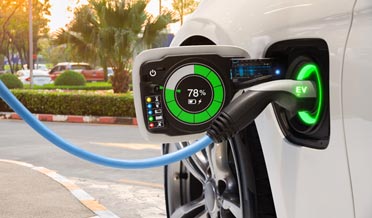EV Home Charging: Most Common Questions Answered
EV Home Charging FAQs
If you anticipate buying a new car in the near future, consideration of an electric vehicle (EV) is most likely a part of the discussion. The U.S. Department of Transportation has set a goal to see 50% of all new vehicles sold in 2030 being EVs, with 500,000 strategically placed charging stations.1 A little information might help you make an informed decision, so consider these important factors concerning the everyday use of electric vehicles.
Electric Vehicles Are Overcoming Range Anxiety
Early versions of EVs had a limited range and drivers feared being stranded alongside the road with a dead battery. Battery technology has reduced that fear with more powerful batteries; 100kWH batteries are now available. Expect a new EV to boast of providing between 200 to 300 miles per full charge; by 2028, the anticipated range is 400 miles. The average daily commute in the U.S. is about 40 miles, so EVs can meet the day-to-day travel needs of most families.2
Charging the Battery
EV Home Charging options have improved, further reducing the stress of range anxiety. Three levels of chargers are currently available:
- EVs come with a simple charging system that plugs into standard outlets; it is slow—a full charge for a large battery might take 20 hours.
- Level two chargers can be installed in a residence, utilizing a dedicated circuit on your electrical service panel. A full charge for a large battery might take 6-8 hours.
- Level three chargers are commercial, for-pay chargers, and can provide a full charge to a large battery in about 30 minutes.
With several EV Home Charging options, car buyers can have confidence concerning regular charges.
Battery Longevity
An important consideration for an EV purchase is the lifespan of the battery; batteries are expensive, so understanding battery longevity is important. The estimate for current technology batteries is approximately 200,000 miles, which is comparable to the lifespan of most internal combustion engines.
How long an EV will last for you is determined by how many miles you drive annually.3 Most people drive their cars between 12,000 and 14,000 miles annually, so EV batteries will last between 14 and 16 years. Watch for the manufacturer’s warranty of 8 years or 100,000 miles; Federal regulations require an 8-year warranty.
Batteries and the Environment
EV batteries are complex technological constructs made from very common metals and chemicals; they are made from nickel, cobalt, and an electrolyte lithium salt solution. Nothing about EV batteries is specifically hazardous. When these batteries begin to lose their ability to hold a charge, they are still very strong.
Car manufacturers commonly partner these batteries with solar chargers and use them to power small appliances, such as vending machines. When the time comes to decommission them, their parts can be harvested and recycled; 80% of the materials can be reused.
If you make a decision to purchase an EV, installing a level two EV Home Charging station in your home will bring great peace of mind. APH Electric can add a dedicated circuit to your service panel, powering the charging station.
Even a completely discharged battery will charge overnight, beginning each day with a full charge. On occasion, you may need to find a commercial charging station, but an in-home EV Home Charging will make your new EV very convenient.
Have Questions About EV Home Charging?
With our four decades of experience as an electrical services contractor, AirPro Houston provides you with the skill and expertise to help answer your EV Home Charging questions.
We have financing options available with great options with up to 72-month terms with approved credit. Call our teams of Electricians at 281-880-8805 and let us partner with you for all of your electrical repair, Home Generator installation, and electrical installation needs.

1 https://www.transportation.gov/rural/ev
2 https://www.kbb.com/car-advice/how-long-does-take-charge-electric-car/
3 https://www.fhwa.dot.gov/ohim/onh00/bar8.htm
